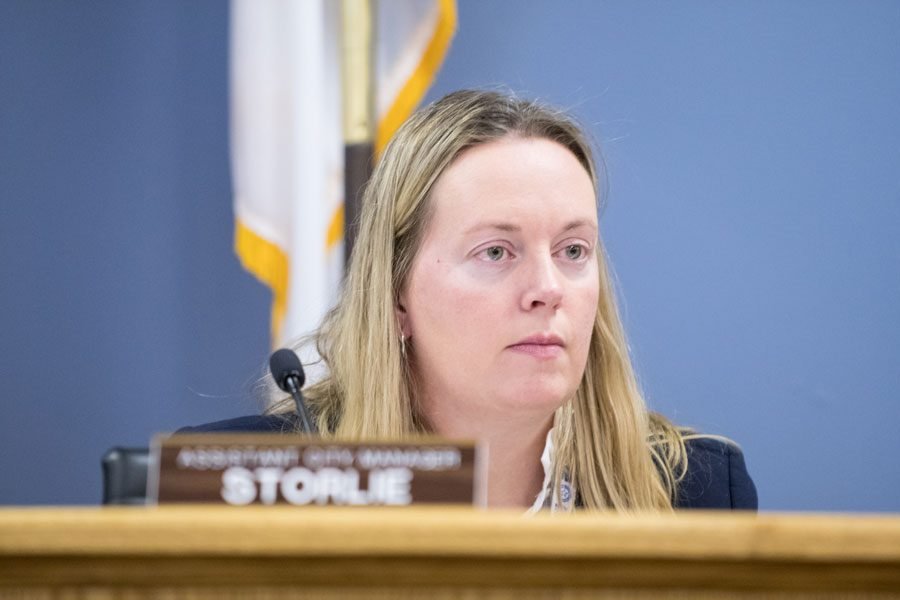Aldermanic candidates debate mayor-council model, reparations at NAACP forum
Daily file photo by Colin Boyle
Candidates sparred over the role of the city manager in a NAACP forum Tuesday. Erika Storlie was confirmed as Evanston’s city manager in October.
March 4, 2021
Aldermanic candidates debated shifting Evanston’s government from a council-manager form to a “strong mayor” form during a forum Tuesday.
The forum, hosted by the Evanston NAACP focused on reparations, city support for small businesses, and restructuring the balance of power between mayor and city manager. About 40 residents attended the Zoom forum, which featured 11 aldermanic candidates across 7 of Evanston’s wards.
The city currently runs on a council-manager model, which means city manager Erika Storlie — appointed by City Council last fall — carries out City Council policies, prepares the city’s budget and supervises staff, among other executive duties, while current mayor Steve Hagerty serves as a political leader interfacing between the government and the community.
5th Ward candidate Bobby Burns said he’s concerned transferring power from the city manager to the mayor could drive up the cost of running for mayor. Incumbent Ald. Peter Braithwaite (2nd) agreed, and said more expensive elections could deter people of color from running for the office.
On the other hand, incumbent Ald. Tom Suffredin (6th), 5th Ward candidate Carolyn Murray, 7th Ward candidate Mary Rosinski and 2nd Ward candidate Darlene Cannon all said a mayor-dominant system would increase transparency and accountability.
“I think that our current form of government, with our city manager, is not leading with care and concern about the long term impact it is going to have on marginalized residents,” Cannon said. “We need to reevaluate what we are doing right now.”
1st Ward candidate Clare Kelly also advocated for instituting a strong, salaried mayoral role, saying because the current mayor position requires the official to hold additional employment, the council-manager system is elitist.
Additionally, she challenged the current city manager’s $225,000 salary.
“We need to figure out why we are paying our city manager more money than the governor of Illinois, the governor of California and the mayor of Chicago,” Kelly said.
In regards to plans for Evanston’s economy during the pandemic, almost all candidates emphasized listening to small businesses and restructuring Downtown Evanston to draw in more commercial traffic.
When asked whether Council should vote to expand the reparations program in future phases to include public assets, Braithwaite said the current first step for reparations is accumulating the $10 million dollars.
Braithwaite, a member of the reparations subcommittee, said as some residents call for a re-evaluation of the program, it is important they pay attention to subcommittee conversations and track the program’s process on the city website.
“We are at the first step of this, with so much room to go,” Braithwaite said.
Murray said it is important for funds to flow through Black-owned banks. Braithwaite stressed the importance of private entities like banks and local business owners contributing to the city’s fund. He added the city is hoping to add three more cannabis dispensaries that will draw more revenue for the $10 million fund.
Rosinski, along with Kelly and 4th Ward candidates Diane Goldring and Jonathan Nieuwsma, all said they are hesitant to move forward with any reparation plans until the reparations eligibility surveys have been widely distributed among Black communities. On Feb. 26, the reparations committee reviewed the preliminary results of the survey, which gauges interest in a homeownership, home improvement and mortgage assistance program.
In developing reparations policy, Goldring said she wants the input of former Black Evanston residents who have since emigrated from the city.
When candidates were asked to identify priority issues within their wards, Rosinski said the 7th Ward specifically struggles with high property taxes — a problem she said feels ironic, because the 7th Ward sits by Northwestern University, which sits on over 230 acres but is exempt from paying taxes on that land.
According to Rosinski, residents have been frustrated by Northwestern athletics facilities encroaching into local neighborhoods for athletics facilities.
“I’ve been trying to try to keep them in their place,” Rosinski said, “Have your sports, but also be a fair share partner.”
Email: [email protected]
Twitter: @yimingfuu
Related Stories:
— Nieuwsma, Goldring projected to advance in 4th Ward aldermanic race


